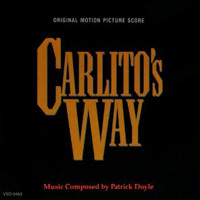- Composed by Patrick Doyle
- Varèse Sarabande / 1993 / 41m
Brian de Palma’s superb 1993 film Carlito’s Way saw the director team up with Al Pacino again, a decade after they had made Scarface. This time Pacino plays a Puerto Rican criminal released from prison after having his sentence overturned by his lawyer (Sean Penn) on a technicality 5 years into a 30-year term. Pacino wants to go straight, but he inhabits a world in which most people he knows are criminals, and he ends up getting dragged back into that world. It’s showy and over-the-top – it’s Brian de Palma – and supremely entertaining.
As I point out whenever I review the score for one of his films, De Palma’s worked with an extraordinary array of musical talent over the years – Bernard Herrmann, John Williams, Pino Donaggio, Ennio Morricone, Ryuichi Sakamoto, Danny Elfman. Carlito’s Way led him to work for the only time with a very surprising choice, Patrick Doyle – he was just four years into his film composing career at the time, and this was just his seventh film score. As it turns out, he was an inspired choice, writing a brilliant score that – in tune with de Palma traditions – is gleefully bold and expansive and works as an absolutely perfect complement to the film.
The five-minute opening title music is nothing short of stunning – Doyle immediately launches into an impassioned, tremendously moving string elegy, the violins reaching for their highest registers; composer and director are plastering a kind of saintly halo above the central character. The film’s structure is such that the opening is actually the ending, with the rest of the film showing how things got to that point; so there is an air of finality to the music, but it doesn’t make the album disjointed at all – it’s painful, anguished, desperately sad – yet extremely beautiful.
Indeed, following the opening, the album immediately moves to “Carlito and Gail”, which introduces a tender piano melody before the elegiac strings return, this time painting a portrait of distant love, of longing and regret. But this develops later into something very different – the piece concludes with a far more immediate romantic air, full of life as the pace quickens, the tone lightens. Superb, clever writing. The romance blossoms further in “The Cafe”, even sunnier before a sudden shift signals the arrival of some rain clouds. “Laline” is entirely different, a piece of jazzy source-like music for sax, piano, percussion and bass.
Almost half way into the album and there hasn’t been the vaguest hint of action music yet, but this finally arrives in “You’re Over, Man”, an urgent, stabbing piano figure opening the piece before giving way once more to the beautiful strings. This doesn’t last long – there’s more jazz in the wonderfully-titled “Where’s My Cheesecake”, this time Doyle conjuring up a steamy, erotic atmosphere before unexpectedly unleashing a grand, sweeping, major-key romantic orchestral romp to conclude the piece.
“The Buoy” is a dark, menacing, growling piece of action – a staccato flute ostinato contrasts with low-end string figures and an incessant rhythmic beat of percussion quite brilliantly. At first it’s not all-out thrills, more a precursor to what’s to follow – a note of the impending explosion – and that duly arrives with the brassy blast midway through the piece before the distinctive string style of the early parts of the score mutates into something darker, something if anything even more filled with anguish. “The Elevator” sees the stabbing piano figure of “You’re Over, Man” appear again, this time in extended form; and then “There’s an Angle Here” extends the action further, things demonstrably building and building over the course of these cues to something you just know is going to be pretty spectacular.
Sure enough, “spectacular” is about the only word which could be applied to the monumental ten-minute “Grand Central”. The now-familiar action motif blasts out instantly but this time from the horns and trombones rather than piano or flute on which it has been heard previously and Doyle builds from this a real tour de force, breathlessly exciting and with a real epic sweep. There’s such an impressive flow to it, very rare in action music – Doyle makes you sail through choppy waters, but it’s one hell of a ride.
The album concludes as it began, “Remember Me” offering a reprise of the extraordinary opening elegy. Carlito’s Way is one of Patrick Doyle’s finest scores, a portrait of a tragic portion of the life of someone seeking redemption but not being able to shake off past misdeeds. The final cue is so moving, so passionate – and the whole album is simply a treat, an intelligent, up-front, dramatic musical work that can stand proudly alongside the other truly great film scores to have accompanied the films of Brian de Palma.
Rating: *****
facebook.com/moviewave | twitter.com/MovieWaveDotNet | amazon.com













As always – wonderful review!!!!!! THANKS
Well, I have to concur with your enthusiam for the score, Mr Southall. It is by far, one of Doyle’s greatest achievements. The elegaic opening and closing theme offer us melancholy from Brigante’s perilous lifestyle. The epic ‘Grand Central’ cue blew my mind when I first heard it – and is probably one of the best action cues written in the 90’s.
It is a pity that Doyle’s writing style has taken on a strange ‘Remote Control’ influence at the moment (‘Apes’ and ‘Thor’ come to mind). I would love it if he returned to this style of writing.
This score is a must for Patrick Doyle fans, and soundtrack collector’s alike.
I am very late to the party in this one. Saw the film for the first time at the weekend. Really enjoyed it. The music is exceptional. Fantastic score!